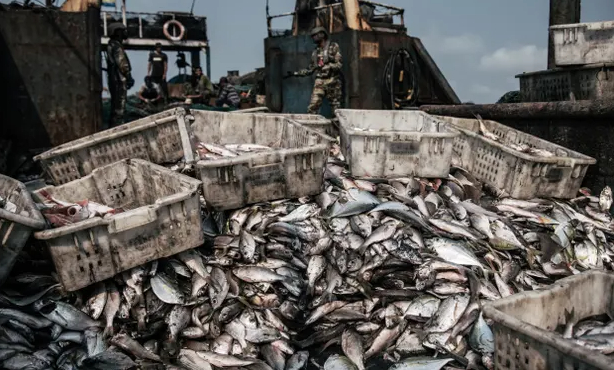June 21, 2025 | 01:12 GMT +7
June 21, 2025 | 01:12 GMT +7
Hotline: 0913.378.918
June 21, 2025 | 01:12 GMT +7
Hotline: 0913.378.918

An illegal catch seized by Sea Shepherd and Gabon authorities off Gabon, in west Africa. Photo: Rebecca Griffiths
Up to 6% of global fishing activity is hidden because commercial vessels disable their tracking systems, a practice that can be used to hide illegal fishing, according to a new study.
Ships use automatic identification systems (AIS), tracking beacons that enable them to be located on global shipping maps. Researchers applied a machine learning algorithm to a dataset of fishing vessel activity compiled by the non-profit Global Fishing Watch, which included more than 3.7bn AIS messages from fishing vessels between 2017 and 2019.
They discovered geographical hotspots for ships disabling their trackers, including west Africa, the coast of Argentina and the north-west Pacific – suggesting these are locations where illegal, unreported and unregulated (IUU) fishing is likely to be taking place.
IUU fishing accounts for one-fifth of global fisheries’ catches, causing up to $23.5bn (£20bn) in economic losses annually. It is the third most lucrative natural resources crime after timber and mining. It is also a big driver of marine ecosystem destruction and has been linked to human rights violations.
“This is the first time intentional AIS disabling has been quantified and mapped on a global scale,” said the report’s author, Heather Welch, a spatial ecologist at University of California Santa Cruz. “Prior to this work, we didn’t have an understanding of how big a problem disabling is, where it happens, who does it and why they do it.”
They found that AIS disabling is a risk factor for “two nefarious behaviours: fishing in unauthorised locations and unauthorised transshipments”, said Welch, whose research was affiliated with the National Oceanic and Atmospheric Administration (Noaa) and the Southwest Fisheries Science Center.
Transshipment – the unloading of goods from one vessel to another – can be used to launder illegally caught seafood into the supply chain and has been linked to forced labour and human trafficking, Welch said. Transshipment and illegal fishing have an environmental cost, and damage national revenue and jobs, she added.
AIS systems are not universally mandated, and the act of disabling an AIS device is not illegal in itself. Legal reasons for disabling include hiding a location from competitors, and sometimes pirates. But ships going dark is a “big red flag”, according to Global Fishing Watch.
The study results suggest that AIS disabling was highest near transshipment hotspots and the maritime boundaries of countries’ exclusive economic zones (EEZs), particularly contested ones. More than 40% of the total hours lost to suspected disabling occurred across four IUU hotspots: the north-west Pacific (13%), next to the EEZs of Argentina (16%) and west African nations (8%), and near Alaska (3%).
Tuna purse seine fishing boats had the highest levels of vessel activity obscured by AIS disabling (up to 21%), followed by squid jiggers (up to 7%), and drifting longlines and trawlers (both up to 5%), the report found.
In terms of the total number of disabling events, China-flagged ships had the most followed by Taiwan, Spain and the US, Welch said. By fraction of time lost to disabling events, Spain had the highest, followed by the US, Taiwan and China. However, Chinese fleets spend longer at sea than those of other nations.
Welch suggested authorities could use “real-time information on disabling” for patrolling at sea, or to carry out inspections of ships in port that had switched off their AIS devices in suspicious circumstances.
(The Guardian)

(VAN) Poultry production in Poland, which has only started recovering from devastating bird flu outbreaks earlier this year, has been hit by a series of outbreaks of Newcastle disease, with the veterinary situation deteriorating rapidly.

(VAN) Extensive licensing requirements raise concerns about intellectual property theft.

(VAN) As of Friday, a salmonella outbreak linked to a California egg producer had sickened at least 79 people. Of the infected people, 21 hospitalizations were reported, U.S. health officials said.

(VAN) With the war ongoing, many Ukrainian farmers and rural farming families face limited access to their land due to mines and lack the financial resources to purchase needed agricultural inputs.

(VAN) Vikas Rambal has quietly built a $5 billion business empire in manufacturing, property and solar, and catapulted onto the Rich List.

(VAN) Available cropland now at less than five percent, according to latest geospatial assessment from FAO and UNOSAT.

(VAN) Alt Carbon has raised $12 million in a seed round as it plans to scale its carbon dioxide removal work in the South Asian nation.